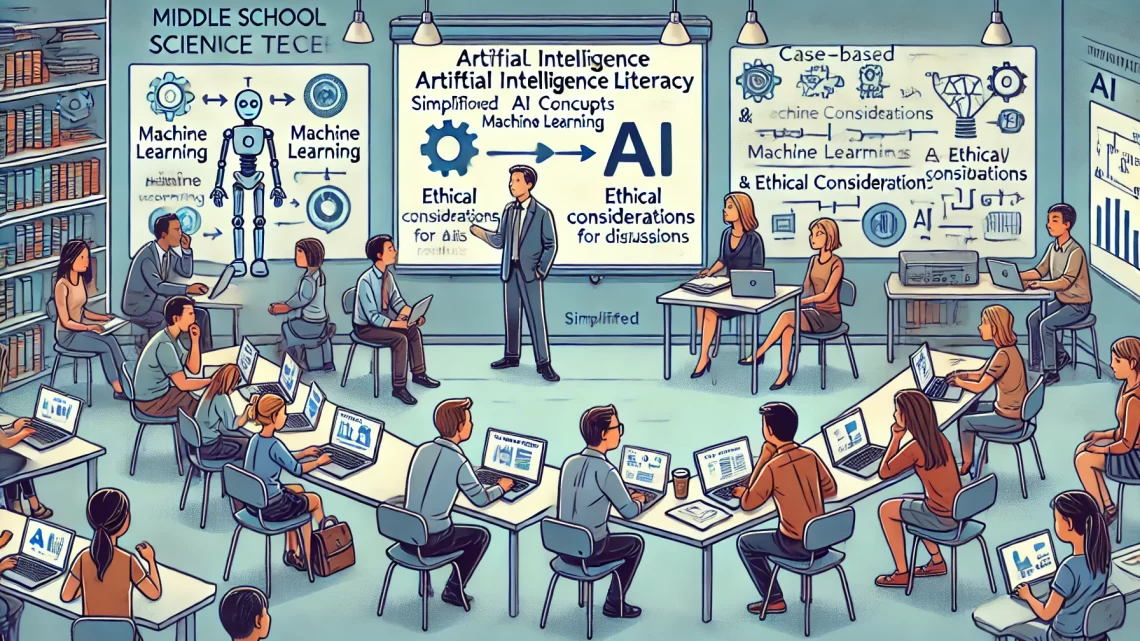
Enhancing Teacher AI Literacy
December 18, 2024In the rapidly evolving landscape of artificial intelligence (AI), empowering educators to effectively understand and integrate AI into teaching is critical. A recent research study delves into the effectiveness of a case-based professional development (PD) program aimed at middle school science teachers. The program explored how case-based learning (CBL), leveraging authentic problem scenarios, impacts teachers’ AI literacy and integration skills. By employing a variety of case problem structures, the study provided valuable insights into the dynamics of teacher learning and the transformative potential of case-based AI PD.
Why Case-Based AI PD?
Case-based learning situates complex tasks within real-world scenarios, enabling teachers to connect theory with practice. This approach encourages reflection, problem-solving, and collaborative learning while addressing critical domains of AI literacy: understanding AI concepts, applying AI tools, evaluating AI technologies, and considering ethical implications.
The study focused on three distinct case problems—well-structured, moderately structured, and ill-structured—designed to address varying levels of complexity and foster diverse learning experiences. Teachers engaged in collaborative discussions, analyzed scenarios, and devised solutions based on their knowledge, experiences, and the instructional content provided.
Overview of the case-based AI PD structure and major activities.
| Topic | Format | Major activities |
|---|---|---|
| Pre-PD survey | Individual | 1. Teachers signed consent forms 2. Teachers completed the pre-PD survey |
| Defining and introducing AI and AI literacy? | Instructor-led lecture | 1. What is AI, and what is its impact? 2. Generative AI tools 3. What is AI literacy, and what are the five big ideas in AI? |
| AI-enhanced inclusive teaching for multilingual learners | Rule-using problem case | 1. The instructor introduced instructional strategies and AI tools that can be used to support multilingual learners. 2. Participants engaged in case-based discussion in small groups. 3. Participants presented their solutions to the whole group. |
| Inq-ITS best practices | Diagnosis-solution problem case | 1. The instructor introduced Inq-ITS briefly and led a brief workshop to help teachers sign up for their teacher accounts and explore the platform 2. Participants engaged in case-based discussion in small groups. 3. Participants presented their solutions to the whole group. |
| Responsible use of AI | Dilemma problem case | 1. The instructor led a five-minute warm-up discussion to introduce the topic and the case 2. Participants engaged in case-based discussion in small groups. 3. Participants presented their solutions to the whole group. 4. The instructor provided a short lecture covering AI ethics and responsible uses (e.g., data bias, privacy, and transparency concerns) |
| Post-PD survey | Interactive online questions | Teachers completed the post-PD survey |
Key Impacts of Case-Based AI PD
1. Increased Understanding of AI
The program significantly enhanced teachers’ foundational understanding of AI concepts, such as machine learning, classification, and generative AI tools. Teachers reported a broader scope of knowledge, demonstrating increased confidence in identifying and explaining AI functionalities.
Quantitative data from pre- and post-program surveys showed a notable rise in AI literacy, with the greatest gains in understanding AI concepts. For example, teachers’ ability to comprehend AI functionalities improved by an average of 1.285 points, reflecting the impact of direct instruction and case-based application.
2. Enhanced Application in Teaching
Teachers became more adept at incorporating AI tools into their pedagogical practices. They explored tools like ChatGPT and automatic translators to support activities such as adjusting reading levels, organizing ideas, and providing personalized feedback. This hands-on approach fostered enthusiasm and readiness to experiment with AI in classrooms.
3. Critical Evaluation of AI Tools
Case-based discussions prompted teachers to critically evaluate the pedagogical utility and ethical implications of AI technologies. Teachers moved beyond technical assessments to consider broader concerns, such as data privacy, bias, and equitable access. They began developing guidelines for responsible AI use and emphasized fostering digital literacy among students.
4. Ethical Considerations
A significant outcome of the PD program was the heightened awareness of ethical issues surrounding AI. Teachers reflected on challenges like plagiarism, privacy, and the societal impact of AI tools. They incorporated discussions on responsible AI use into classroom policies, ensuring students are equipped to navigate ethical dilemmas in an AI-driven world.
5. Collaborative Problem-Solving
Case-based learning fostered collaborative problem-solving, with teachers drawing from personal experiences and group discussions. Complex scenarios, particularly ill-structured problems, stimulated critical thinking and innovation. Teachers co-constructed solutions, blending prior knowledge with new ideas generated during the PD program.
The coding protocol for analyzing case-based discussion data.
| Dimension | Code | Definition |
|---|---|---|
| Case-based discussion | Problem | Discussing and identifying case problems/ Identifying instructional problems in real life. |
| Contextual | Contextual details of the case/ Contextual details in real life. | |
| Solution | Discussing solutions for the case problems or real-life problems/ Solutions presented in the case. | |
| Facilitation | Instructor’s facilitation during the case discussion. | |
| NA | irrelevant | |
| AI literacy | Knowledge | Teachers understand the basic concepts, knowledge about, and procedures for using AI in teaching. |
| Application | Teachers know when and exactly how to use AI tools in class correctly. Teachers provide supplementary support for AI usage. Teachers communicate and collaborate effectively with AI. | |
| Evaluation | Teachers evaluate AI technologies thoroughly and critically. Teachers know the limitations of any issues with an AI tool. | |
| Ethics | Teachers pay attention to AI ethics issues such as biased programming, lack of transparency, privacy issues, and academic integrity. | |
| Sources of Knowledge co-construction | Personal experience | Experience from previous teaching or personal uses of technology. |
| Professional Development | New ideas/strategies/information presented during the PD. | |
| New ideas | New ideas emerge from discussion. | |
| NA | Instructor facilitation/ Irrelevance to case |
The Role of Case Problem Structure in Teacher Learning
The structure of case problems significantly influenced how teachers approached problem-solving and knowledge application:
- Well-Structured Problems: These scenarios focused on applying established rules or strategies. Teachers relied heavily on personal experiences, often prioritizing familiar methods over new content introduced in the PD program.
- Moderately Structured Problems: These cases required diagnosing issues and proposing solutions, fostering analytical skills and creativity. Teachers combined personal experiences with new insights from PD content, resulting in more dynamic discussions.
- Ill-Structured Problems: These dilemmas, lacking clear solutions, challenged teachers to consider ethical, moral, and practical dimensions. They encouraged critical thinking and the integration of multiple knowledge sources, including post-discussion reflections.
The study revealed that moderately and ill-structured cases generated richer discussions on AI-related topics, while well-structured cases were effective for applying foundational knowledge.
Transformative Changes in AI Literacy
The case-based AI PD program led to significant improvements across all domains of AI literacy:
- Knowledge and Understanding: Teachers gained a deeper grasp of AI concepts, tools, and their educational applications.
- Application: They became more proficient in integrating AI tools into lesson planning and instruction.
- Evaluation: Teachers critically assessed AI technologies for classroom use, considering both pedagogical and ethical dimensions.
- Ethics: Discussions emphasized responsible AI usage, inspiring teachers to embed ethical guidelines into their teaching practices.
Designing Effective Case-Based AI PD
To maximize impact, effective AI PD programs should combine direct instruction with diverse case-based discussions. Case problems should range from well-structured to ill-structured, enabling teachers to:
- Apply existing knowledge to straightforward scenarios.
- Develop analytical and creative problem-solving skills.
- Navigate complex dilemmas that encourage ethical and reflective thinking.
By situating learning in real-world contexts, case-based AI PD equips educators to address the interplay of pedagogy, content, and AI technology in authentic teaching environments.
Conclusion
Case-based professional development is a powerful strategy for enhancing teacher AI literacy. By combining foundational instruction with opportunities to engage in authentic problem-solving, this approach prepares educators to navigate the complexities of AI integration in education. With thoughtful design and diverse case structures, AI PD programs can empower teachers to harness the potential of AI while fostering ethical and responsible use in classrooms.
As AI continues to transform education, equipping teachers with the skills to understand, apply, evaluate, and ethically integrate AI will be essential to preparing students for an AI-driven future.
Reference
Ding, A. C. E., Shi, L., Yang, H., & Choi, I. (2024). Enhancing teacher AI literacy and integration through different types of cases in teacher professional development. Computers and Education Open, 6, 100178.

















